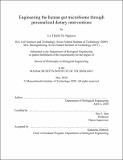Engineering the human gut microbiome through personalized dietary interventions
Author(s)
Nguyen, Le Thanh Tu.
Download1241089138-MIT.pdf (28.40Mb)
Other Contributors
Massachusetts Institute of Technology. Department of Biological Engineering.
Advisor
Eric J. Alm.
Terms of use
Metadata
Show full item recordAbstract
The human gastrointestinal tract is home to a dense and dynamic microbial community. The composition and metabolic output of the human gut microbiota have been implicated in many diseases: from inflammatory bowel disease, colorectal cancer, and diarrheal diseases to metabolic syndromes like diabetes. Treatment of these diseases will likely require targeted therapeutic interventions aimed at modulating the abundance and metabolism of specific commensal microbial species or probiotics. A promising avenue for such interventions is through diet, where the dietary components act as substrates for the species producing beneficial metabolites one wishes to enrich. In this thesis, I focus on a dietary intervention study in healthy individuals. Since the human gut microbiota is known for its highly heterogeneous composition across different individuals, it comes as no surprise that a more personalized approach is preeminent. We first test effects of multiple micronutrients spiked into a fixed diet. Using a highly controlled diet within the cohort, we identify strong and predictable responses of specific microbes across participants consuming prebiotic spike-ins. However, select macronutrient spike-ins like unsaturated or saturated fat and protein, produce no predictable response. We next investigate prebiotic supplement in diet further as well as its downstream products, short chain fatty acids, in the digestive tract. We look to alleviate the stress of a highly controlled, low complexity diet on participants by testing the effect of different prebiotics simultaneously ex vivo. We show that individuals vary in their microbial metabolic phenotypes (as in they produce different quantities and proportions of short chain fatty acids from the same prebiotic inputs) mirroring differences in their microbiota composition. Finally, we run a pilot study to elucidate how closely our ex vivo experiment results may reflect the in vivo changes following a short-term dietary fiber supplementation. In addition to obtaining preliminary data on this direct comparison, we also explore different parameters for generating high-throughput data on personalized dietary interventions. Together, these projects provide the framework for building a predicative model for the effect that prebiotic dietary supplementation will have on gut microbiota's composition. Such a prediction model would be equally helpful in both enhancing individuals' gut health and improving gut dysbiosis in cases of disease.
Description
Thesis: Ph. D., Massachusetts Institute of Technology, Department of Biological Engineering, May, 2020 Cataloged from student-submitted PDF version of thesis. Includes bibliographical references.
Date issued
2020Department
Massachusetts Institute of Technology. Department of Biological EngineeringPublisher
Massachusetts Institute of Technology
Keywords
Biological Engineering.